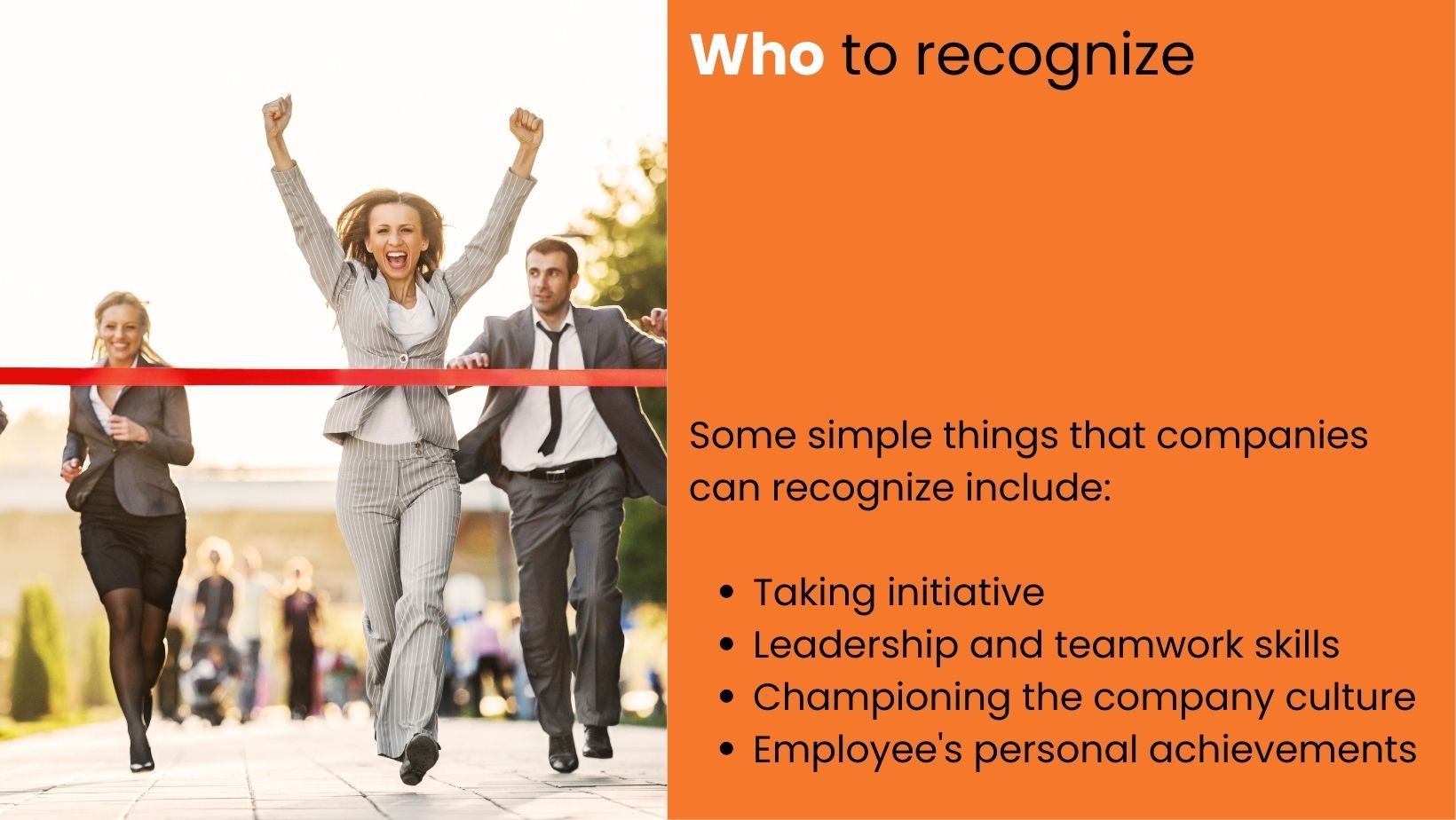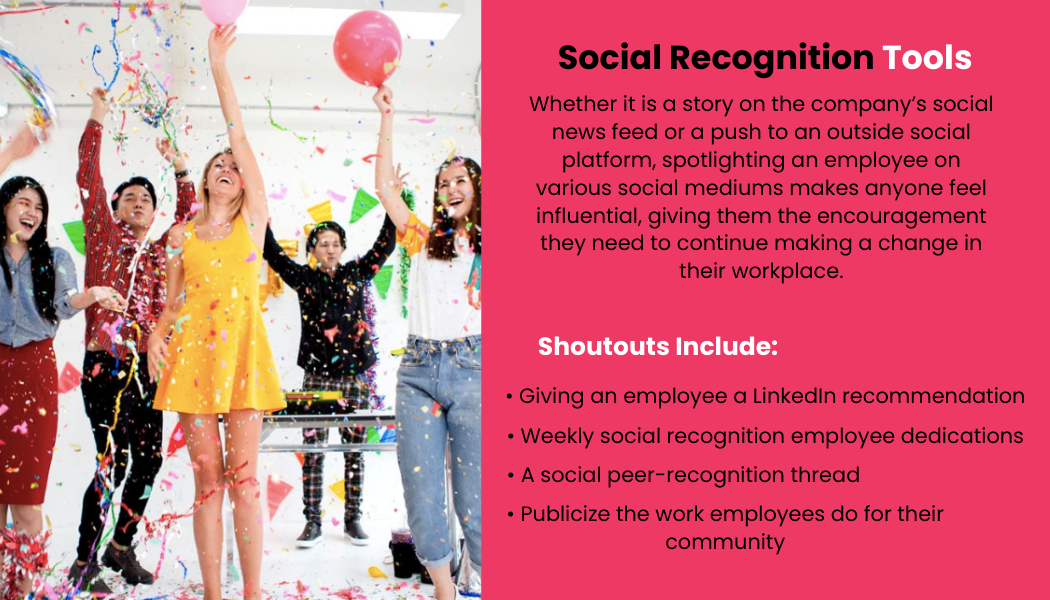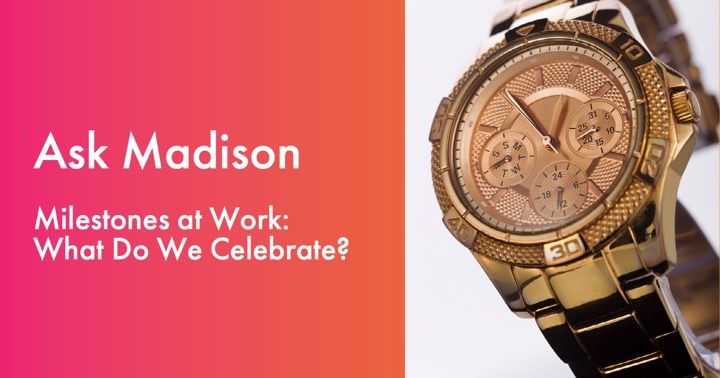A plaque on the office wall may be outdated in an increasingly remote work-world.
Rarely do we see 10-year and 15-year work anniversaries, given a recent average tenure of current employers at only 4.1 years in 2020. Particularly with remote work increasing, celebrations can be confusing and challenging. How do we transition from traditional work milestones and anniversary recognition to accommodate for today’s modern workforce?
A modern guide to recognizing employee milestones
Celebrating employees in the workplace has proven to keep a healthy work environment and lead to more successes. However, with working conditions constantly changing, workplace recognition may need to be revisited in some organizations. According to a Gartner survey, only 24% of employees feel acknowledgement at work for their contributions. Considering this, and the change in workplace tenure over the years, it paints a different picture than one that existed 30 years ago when people exited their lifelong jobs with a gold watch.
Below, Ask Madison outlines a guide answering the four W’s of modern employee recognition.
Who to Recognize
Employee recognition should not just be tied to making quotas or company achievements. Instead, it should be rooted in sincerity and effort to create the intended effect- to value and appreciate people. Employee expectations on how they would like to be valued and appreciated, though, has evolved over the years, perhaps playing a key role in the decrease of employee tenure. To meet employees where they are today, recognition doesn’t necessarily have to be tied to a set of requirements.

At the end of the day, we are humans and want to be recognized for the little things that go unnoticed. This rings true specifically in a work world where companies may not know anymore where their employees will be five years from now.
Because of this reality, it can also be easy to forget to celebrate time at a company when we are not all in the office. However, it is crucial to not to fall into this trap because time has become a rare commemoration. Hence, the big who that should never go unnoticed are those who have spent a period of time at their jobs.
A few ways to do this include:
- Off-site group celebrations 3 times per year
- Synchronized luncheon at workplace
- Sending remote workers celebratory dinners
What to Do
There isn’t any specific course of action that is deemed as the ‘right’ way to recognize your employees. This practice should be personalized according to whom the person is and what they value. For this reason, employers should carry out their recognition based on three tactics: be specific, be unique, and be fulfilling.



This tactic is based on the fact that employees are 4.6x more likely to do their best work if they feel heard. People will want to stay in a place where they are treated as humans, not just another number.
Taking note that we are not in the workplace that existed 30 years ago is essential. People are worth more than one gift they receive at the end of 20 years of service. Employees should be celebrated weekly and in our modern workforce, this is possible due to recognition programs such as Maestro.
Maestro is a uniquely configurable cloud-based SaaS technology powers a customized system for your workplace and your people. Besides implementing recognition and anniversary programs, it offers incentives as well. Organizations with advanced recognition programs such as Maestro are 12x more likely to have strong business outcomes because they include the components which keep tenure alive and what drive passion for organizations' work and culture.
When to Recognize
Finding the right time nowadays to give your employees what they deserve can be challenging. Whether it is executed virtually or in-person it should be done regularly. According to NBC News, 79% of people quit their jobs due to lack of appreciation.
This finding continues to highlight that we are humans first and employees second. We spend our whole life craving recognition and utilizing it during our developmental periods and in our psyche. This urge does not stop as we move onto different stages in our life but rather intensifies in the workplace.
When employees feel celebrated is a key component because it helps create new habits in their work as a result of positive affirmations and reassurance.

Where to Celebrate
With growing platforms at people’s fingertips, celebrating is easy and it comes in many forms.
Traditional Route
Take a page from an old book and acknowledge your employees with some thoughtful words of gratitude whether verbal or written.
Some ideas include:
- Personalized Handwritten Letters
- Work Dinners
- Employee Wall of Fame
Although this is a modern guide to recognition, you cannot go wrong with the simple way of life that makes anyone feel celebrated.

A hard work's trip
When companies spend 1% or more of payroll on recognition, 85% notice a positive impact on engagement.
Group incentive travel allows employees that make a company special to continue producing their best work for years to come. It gives them a chance to completely immerse themselves in their work culture and reward them with premium experiences.
Madison Travel utilizes personalized technology to plan and deliver motivational and unforgettable destination trips that are hassle-free for stakeholders. These trips are carefully crafted by incentive experts to ensure the trip’s mission is successful.
Investing in an option like this sends employees the message that they are valuable, something that should not only be expressed when it is convenient, but rather in a culture where it should be embedded. Besides, who doesn’t like a vacation in some of the most sought-after destinations in the world?
As the modern workforce evolves, industry experts will continue to evaluate the tools and resources available to ensure that innovation is paramount and news ways of rewarding and recognizing are created. Guidelines like this exist to remind us that in the world of work, we are humans first and employees second. Recognition should be based on just that notion: what a person would want, not just an employee.



